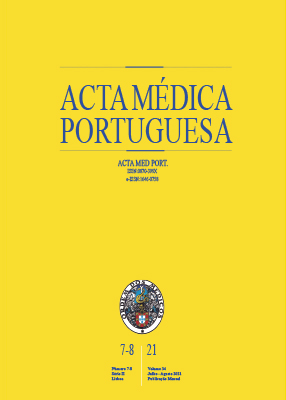Satisfaction of General Practice Trainees with the Teaching Skills of Trainers: An Exploratory and Regional Study
DOI:
https://doi.org/10.20344/amp.13321Keywords:
Education, Medical, General PracticeAbstract
Introduction: In Portugal, requirements for selection and training of General Practice trainers vary across the different regions of the country. The aim of our study was to assess the satisfaction of general practice trainees with their trainers of the Lisbon and Tagus Valley Regional Health Administration.
Material and Methods: General Practice trainees were the target population for our cross-sectional, exploratory study. The authors developed a 16-item questionnaire based on the existing literature. The questions covered the following domains: patient safety, learning environment, trainer’s feedback, the trainee/trainer relationship, assessment of educational progress and continuous professional development of trainers. Items were scored on a 5-point Likert-type scale. Data was collected at a meeting in October 2018 attended by General Practice trainees.
Results: A total of 384 questionnaires were distributed, with a response rate of 59.9%. The majority of respondents were female (79.9%) and all years of specialty training were represented. Our study shows that 60.4% of General Practice trainees from the Lisbon and Tagus Valley Regional Health Administration are very satisfied with the teaching skills of their trainers. However, there was lower satisfaction with trainer’s continuous professional development, trainer’s feedback, and monitoring of educational progress. The majority (57.4%) of respondents did not give feedback to their supervisors about their teaching performance, mostly because they do not feel comfortable doing so or because they have not considered this.
Discussion: The findings show a high degree of satisfaction of the general practice trainees with their trainers of the Lisbon and Tagus Valley Regional Health Administration. The high response rate attained is one of the strengths of the study. The authors make some suggestions for improvement of domains with lower satisfaction levels. Unfortunately, it is difficult to extrapolate the findings nationwide due to the differences between the training programmes of the different regions.
Conclusion: Although there is a high level of satisfaction, there is still potential for improvement, including the expansion of training programmes for trainers.
Downloads
Downloads
Published
How to Cite
Issue
Section
License
All the articles published in the AMP are open access and comply with the requirements of funding agencies or academic institutions. The AMP is governed by the terms of the Creative Commons ‘Attribution – Non-Commercial Use - (CC-BY-NC)’ license, regarding the use by third parties.
It is the author’s responsibility to obtain approval for the reproduction of figures, tables, etc. from other publications.
Upon acceptance of an article for publication, the authors will be asked to complete the ICMJE “Copyright Liability and Copyright Sharing Statement “(http://www.actamedicaportuguesa.com/info/AMP-NormasPublicacao.pdf) and the “Declaration of Potential Conflicts of Interest” (http:// www.icmje.org/conflicts-of-interest). An e-mail will be sent to the corresponding author to acknowledge receipt of the manuscript.
After publication, the authors are authorised to make their articles available in repositories of their institutions of origin, as long as they always mention where they were published and according to the Creative Commons license.









